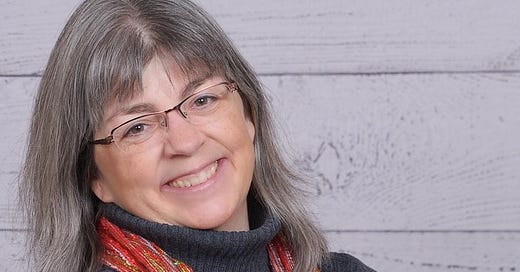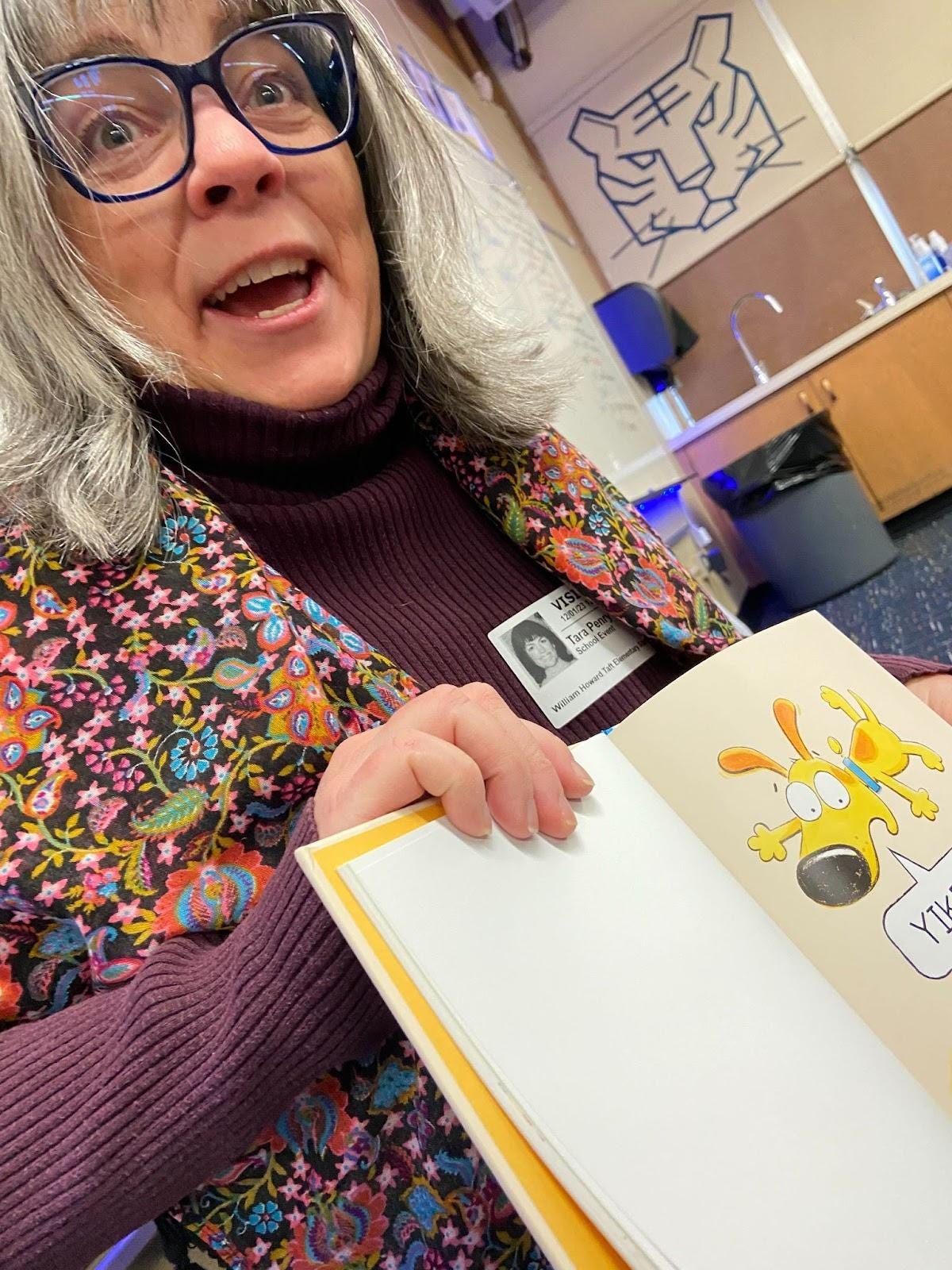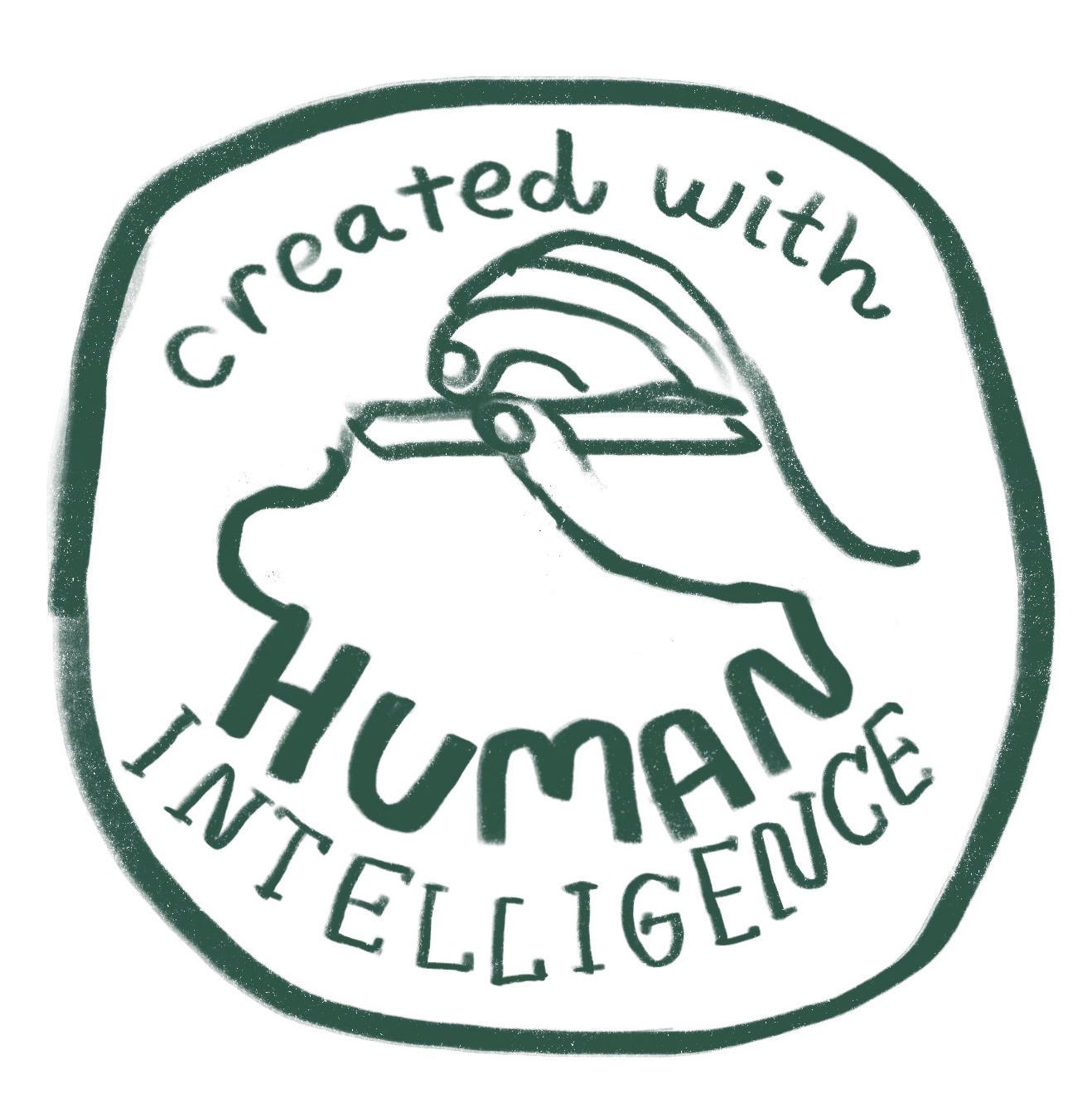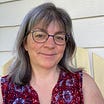The Hallelujah Book & Hope Letter - An Interview with Tara Penry
A Beyond the Bookshelf Profile
Exploring Life and Literature
Dear friends,
is an American Literature professor originally from Seattle and now living in Boise, Idaho. She makes her home there with her two teenage children and the family’s two cats. In her free time, she thinks about fixing the plumbing, clearing weeds from the yard, or cutting out dead branches in the maple tree. However, she usually gives way to a jigsaw puzzle, chocolate, good cheese and cucumbers, a board game or a card game if she can find players. She also enjoys Beethoven’s Ninth Symphony or a nice, long gaze at the clouds. One of her cats has a habit of draping himself over her head and shoulders or pressing his nose into her ears, so whatever she’s doing, there is likely a cat or two involved.Tara, pronounced with an “ah,” like the sound of amazement: TAH-ra, writes the Hallelujah Book & Hope Letter, which she calls “a literature professor’s notes on hope.” She hosts community writing events and shares original perspectives on companionable books.
Please enjoy this interview with Tara.
Personal Journey as a Reader & Writer
Can you share a memory of when you first fell in love with books?
I’m sure it started earlier, but I became aware of a passion for books during elementary school, when my mother used to give illustrated editions of childhood classics as Christmas gifts. I read and reread The Secret Garden and A Little Princess with illustrations by Tasha Tudor over the school holidays. I read the pictures as much as the words in my poetry collection. With my blanket tented over the heat vent and the book in my hands, I never tired of the owl and the pussycat going to sea in their beautiful pea-green boat. Who would?
Was there a particular story or author that captivated you?
I must have been twelve or thirteen when my mother - you see a theme here - handed me her copy of a very thick book, Anya Seton’s Katherine, which probably meant that I was whining very hard about being bored, and I needed something to occupy me for a nice long time.
The novel is based on the life of Katherine de Roët Swynford, the fourteenth-century stepmother of King Henry IV and ancestress of other English monarchs. What made this book so memorable and important to me was that I recognized the name of a minor character named Geoffrey Chaucer, brother-in-law to Katherine. That name was stamped on the spine of my parents’ Great Books of the Western World upstairs in their home library.
How did I know this, the perceptive reader may ask. Ah. I must have spent some leisure hours just staring at the spines of our home books, imagining what must be in them.
In any case, I finished Katherine in that state of enchantment that makes you want to read anything else by that author or even a third cousin of the author. I floated upstairs to the bookshelves and took the CHAUCER volume off the shelf. I don’t know how many days or weeks I pored over my mother’s college edition of The Canterbury Tales, with a modern English translation running alongside the original Middle English. I loved the gorgeous, elusive medieval cadences on the left as much as the marvelous cast of characters that emerged on the right.
I’m certain that my mother was spared any whining from me for a satisfactory length of time. More importantly, I learned to trust the magical, mysterious, and personal pathways through libraries and books. Although it is my job to plan curricula and syllabi, I want my students to leave my classes with curiosity and confidence in bookish serendipity. No matter what book they pick up, I want them to trust that it will lead somewhere dazzling and unexpected, as Katherine and The Canterbury Tales led me.
How has your reading life evolved over the years, from childhood to your work as a professor?
In childhood, reading was always a delight, never a labor. As a professor, most of my reading has been purposeful and instrumental: student papers, emails, drafts and revisions of my own writing, literary criticism, manuscripts for editing, and the like. It’s interesting work to me, mostly, but there is very little time to read books that I am not teaching, reviewing, or writing about. Enchantment is easily lost.
So I’ve learned that book-love must be tended, not taken for granted. I think (and hope) that if you asked any of my students what was more important to me, book-love or the official learning outcomes of a class, they would say, flummoxed at the opposition, “Both,” and then they would follow up: “Well, I mean, book-love, for sure, and after that the learning outcomes.” After my class, I want them to know they can reach for a book in any hard time and magically, mysteriously return to themselves.
Your Hallelujah Book & Hope Letter centers on sharing joy and companionship through literature. What inspired you to create it?
My readers, mostly, and also time.
Back in 2022 I started a weekly letter about literature, community, and enchantment, but I didn’t think the name (Enchanted in America) was very clear or inviting. So I scrawled in a spiral notebook for months about alternative names and missions. That process led to a short list of four names. The Hallelujah Reading Club was one of them. It was extravagant and unexpected, with an energy that felt like me. I have always loved piles of syllables.
But in November 2022, with days getting shorter and my long, arduous divorce only recently completed, the timing for that name was wrong. I relaunched my letter under the name Quiet Reading with Tara Penry and felt massive relief. I could hide out and write whatever I pleased for awhile. I needed a quiet phase – writing, yes, but quietly. The paradox suited the time.
I’m writing this month about how the measure of five years from the COVID shutdowns feels like a cultural and personal graduation. I think I’m not alone in this. One way I’m marking my “graduation” from these last five sluggish years is by reclaiming the name that greeted me like a sunburst when it first came to mind. By now, after more than two years of weekly posts, my letter has drawn to it a community that gives me a Hallelujah feeling, a word of praise in the Judeo-Christian tradition. Hallelujah and hope are what I feel when I sit down to write. Books are my comfort object. I may change the name again, but for now, it has the sound of spring to it – the sound of returning to life.
With books, of course, and the community of readers who care about such things.
The Role & Importance of Libraries
How do you see libraries shaping communities and cultures, particularly in today’s digital age?
From reading rooms of old, libraries are becoming community resource centers with information experts to help us navigate the flood of “content” around us. Yes, I’m nostalgic about quiet rooms lined with academic and popular journals, but also, I believe librarians know their communities best. My university library now has a recording studio, 3D printers, sewing machines, and a poster printer within sight of the front door instead of microfilm readers and the loooooonnnnngggg circulation desk of the past. Yes, I’m a little disoriented in the new space; it lacks a bookish focal point. However, it does get used.
I hope part of the way libraries shape culture is to grant, yes, that the community needs a free recording studio and specialized printers, and that also, once people are in the door for those things, they will become aware of the value of books. I want libraries to model book-love at the same time they provide community service. Right now, my university library walks that fine line with rotating book exhibits and other, smaller book-services on the first floor among the activity centers.
What do you think libraries offer that is irreplaceable, even in an era of abundant online resources?
You might expect me to say “BOOKS!” but it’s something more subtle. For me, a physical library produces a precious energy that my laptop cannot be engineered to replicate.
Call it curiosity pheromones or human sociability, what “circulates” in a physical library is more than books. Whether I’m in a one-room rural library, a distinguished research archive, or a busy urban “information center,” the concentration of something like human effort or aspiration is palpable to me. The whole is greater than the sum of our questions, the parts. We walk in the door hoping for answers, and probably not even noticing that we’re carrying hope. The portion each one of us contributes is so very, very small. Even smaller is the part of hope we leave behind. And yet, for all the diminutive contributions, the HVAC systems in a library are clogged with aspiration, intention, and human hope.
Can you recall a moment in a library that deeply impacted you, either personally or professionally?
I have a proud early memory of my mother checking out a leaning tower of children’s picture books from the public library in downtown Tacoma because teachers had unlimited borrowing privileges. There was no way I was going to lose a birthright like that. I had to become an academic.
It seemed obvious to me that books conferred dignity. I still see evidence of that in my work when my students raise money to buy hand-picked new picture books for kids in our local schools. Those kids with their new books take me back to the Tacoma Public Library with my mother all over again, enlarged with pride and joy by association with such beautiful things.

Teaching & Literature’s Enduring Presence
As a professor of American Literature, how do you encourage your students to engage deeply with books?
I would say that I do not worry about the depth of their engagement so much as getting any genuine engagement at all. Depth will come if engagement is real, so that’s where I focus. I trust that nobody wants to engage superficially. If I accept the students where they are, if I trust the magical reading and writing processes to dignify and enlarge them, depth will come. My job is to make sure they are not made to feel small or unlearned in my class by comparison with their expectations or someone else’s.
For an example, I asked students in a 100-level General Education class this spring to choose a poem to memorize and “live with” before writing about it. Any poem was allowed, 8 lines minimum. I specified that the poem could come from Instagram or popular music. It did not have to be an approved work of high literature, and the choice and recitation did not affect the grade, which was based on a subsequent paper. Every recitation was received with applause, “The World’s Greatest Need” as much as “The Lake Isle of Innisfree.” About half the students exceeded the minimum requirement with their poems, and the other half chose the smallest, simplest verse they could find.
At the end of the project, I asked the students anonymously how many would probably memorize another poem. About two-thirds of these marketing, psychology, and nursing majors (etc) said they probably would. Two-thirds! That’s wonderful. How many 19-year-olds do you know who are memorizing poems? If I succeed in getting students to feel enlarged by any imaginative writing, I believe their reading will deepen with their minds and souls in time.
What is a literary work that you believe is essential reading for today’s generation? Why?
I have two answers. First, I don’t have a single book to elevate above other strong contenders. The most essential thing for young people today is that they read a wide variety of books – period. The more they read, the more they’ll open themselves to the surprising connections between past and present and near and far; the more they’ll discover hidden corners of themselves.
That’s one answer. The other one sounds like an opposite, but both answers ring true to me. Maybe I can choose one essential work for today: Ray Bradbury’s Fahrenheit 451. If there is one book of widest importance to the most young adults, it might be the book about the society that gave up reading without a fight.
The Persistence of Hope & Companionship in Literature
You’ve spoken about finding hope and companionship in literature. Are there particular books that have been sources of comfort or resilience for you?
Oh yes, very much so.
Shakespeare’s sonnet 29 has kept me company in many a difficult time. That’s the one that begins, “When, in disgrace with fortune and men’s eyes, / I all alone beweep my outcast state / And trouble deaf heaven with my bootless cries / And look upon myself and curse my fate …” Just those four lines are usually enough to remind me that suffering is part of the human condition, and mine will pass.
Joy Harjo and Maya Angelou never fail to lift my spirits. Harjo sums it up in a single line of her 2021 memoir in verse, prose, and myth, Poet Warrior: “You will learn how to make right decisions by making wrong ones.”
Another author I turned to frequently after the stresses of COVID shutdowns and my divorce was the late Dutch priest and psychologist Henri Nouwen. Like that passage I just quoted from Poet Warrior, he wrote an entire book in the second person to himself. The Inner Voice of Love started life as a private journal kept by Nouwen on retreat during a very low, lost time of his public, celebrated life. The counsel he gave himself spoke to me in my time-of-the-broken-compass, as well. For example, under the heading, “Remain Attentive to Your Best Intuitions,” he advised himself:
You are living through an unusual time. You see that you are called to go toward solitude, prayer, hiddenness, and great simplicity. … Trust the clarity with which you see what you have to do … You keep asking yourself, ‘What about the ways I have done and said things in the past? What about my many options in the future?’ Suddenly you realize that these questions are no longer meaningful. In the new life you are entering, they won’t be raised anymore. The stage sets that have for so long provided a background for your thoughts, words, and actions are slowly being rolled away, and you know they won’t come back.
Given how much was changing in my own life within the last five years, each short chapter of Nouwen’s book felt like it was spoken to me. For awhile, I adopted the author as “Brother Henri.” I’m sure I was not the first reader to do so.
What do you think makes literature such a powerful force for companionship, even across time and cultures?
I think of reading as a rehearsal space for the lives we haven’t lived yet, and a dressing room for trying on lives we’ll never live. For the duration of the book, we become someone else, as a preschooler tries on the experience of starting kindergarten by reading about it (“Enchanted Time”). From reading we learn that we are not bounded by our skin. Our feelings for our bookish selves and others within the book are actual feelings of affection, outrage, loyalty, and more. Companionship is one of many relations we can form in this world of pantomime and possibility.
When we read and recognize another version of ourselves, there’s relief in knowing we’re not alone.
Final Thoughts
What do you hope readers take away from The Hallelujah Book & Hope Letter?
I hope readers get from my Substack publication what I get from much of my favorite reading: companionship, humor, the “a-ha” of something not yet known about a book or a slice of history; reminders of dignity and renewals of delight.
If you could give one piece of advice to someone seeking joy and companionship in books, what would it be?
Head to the nearest library, of course! Just sit there for a minute. Watch what’s happening. Inhale hope.
Are there any upcoming projects or literary explorations you’re particularly excited about?
I love hosting community writing events like The Hope Library, last fall’s compilation of Poems to Carry in the Blood, and two collections of essays about times when we were Enchanted by a Book. We will certainly continue to see events like these at the Hallelujah Book & Hope Letter, about one every season or two.
For my own writing, other ideas are always percolating. Subscribers will be the first to know which ones will come to life.
Beyond the Bookshelf is a reader-supported publication. If you are looking for ways to support Beyond the Bookshelf, please visit my support page and see how you can help continue the mission of exploring the connection between life and literature.
And I have a tip jar available for those who prefer. Thank you very much.
Until next time,















My thanks to Matthew for reading The Hallelujah Book and Hope Letter carefully enough to ask such good questions! ❤️
"I think of reading as a rehearsal space for the lives we haven’t lived yet, and a dressing room for trying on lives we’ll never live." That is a remarkable reflection! Tara, you're singing my song. As a retired Elementary and Early Childhood teacher I share your ardor for good books, especially the picture book variety. This was such an enjoyable read--thank you!
(Waving hello from Renton WA).